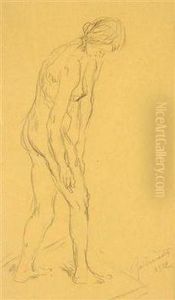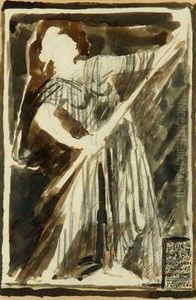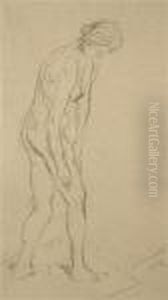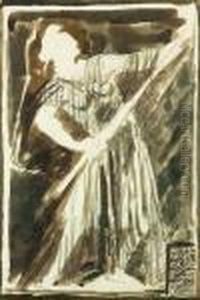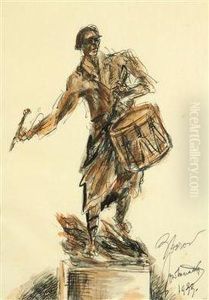Josef Maratka Paintings
Josef Mařatka was a prominent Czech sculptor, born on March 25, 1868, in Prague, which was then part of the Austro-Hungarian Empire. His work is closely associated with the Art Nouveau movement, and he is recognized for his ability to blend classical techniques with more modern, expressive forms. Mařatka's contributions to sculpture are marked by a deep understanding of human anatomy, combined with a poetic interpretation of his subjects, which often drew upon mythological and historical themes.
After studying at the Academy of Fine Arts in Prague under the guidance of Josef Václav Myslbek, Mařatka furthered his education in Paris, where he was influenced by the burgeoning Art Nouveau movement and the works of Auguste Rodin. Rodin's dynamic approach to form and his exploration of the emotional depth in sculpture had a profound impact on Mařatka, shaping his subsequent creations. While in Paris, he became part of an international community of artists, absorbing various stylistic influences that he would later integrate into his own unique approach to sculpture.
Mařatka's work is characterized by a fluidity of line and a detailed, nuanced approach to the human figure, often capturing moments of introspection or the dynamic movements of the body. His sculptures frequently exhibit a strong emotional resonance, reflecting his interest in expressing more than just the physical attributes of his subjects. Among his most notable works are contributions to the decoration of the Municipal House in Prague and various funerary monuments, which combine symbolic elements with lifelike representations.
Throughout his career, Mařatka also engaged in teaching, passing on his skills and artistic philosophy to a new generation of sculptors. His influence is seen in the work of many Eastern European artists, and his legacy is preserved in the collections of several major museums in the Czech Republic and abroad.
Josef Mařatka died on June 5, 1937, in Prague. His death marked the loss of a significant figure in Czech art, one whose works continue to be studied and admired for their technical mastery and emotional depth. Mařatka's contribution to the development of modern sculpture, particularly within the context of Czech art, remains an important part of his enduring legacy.
